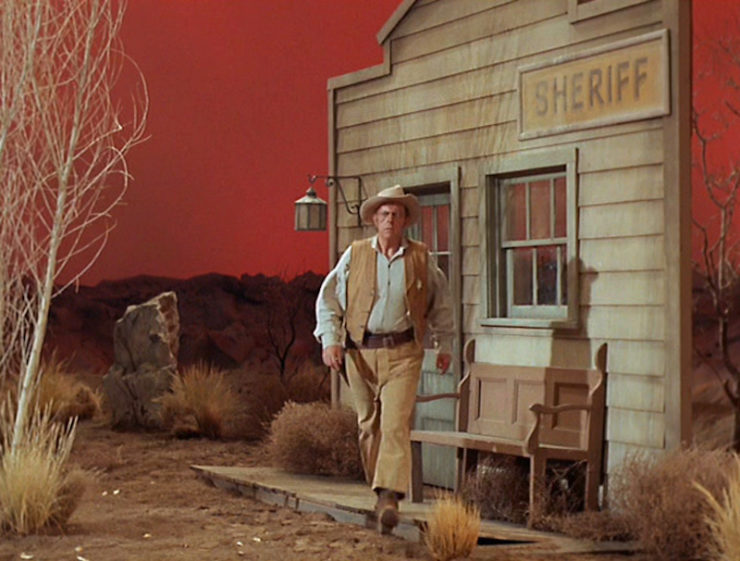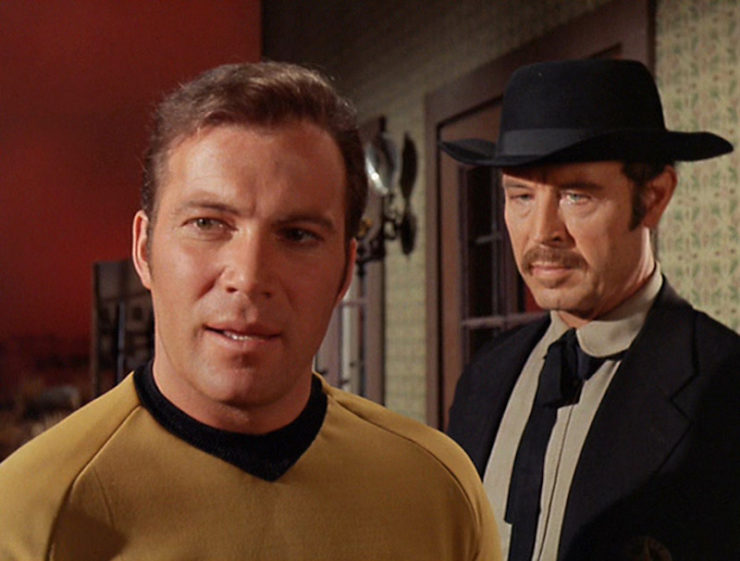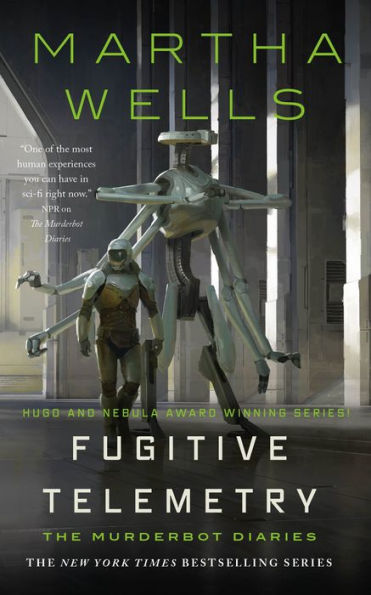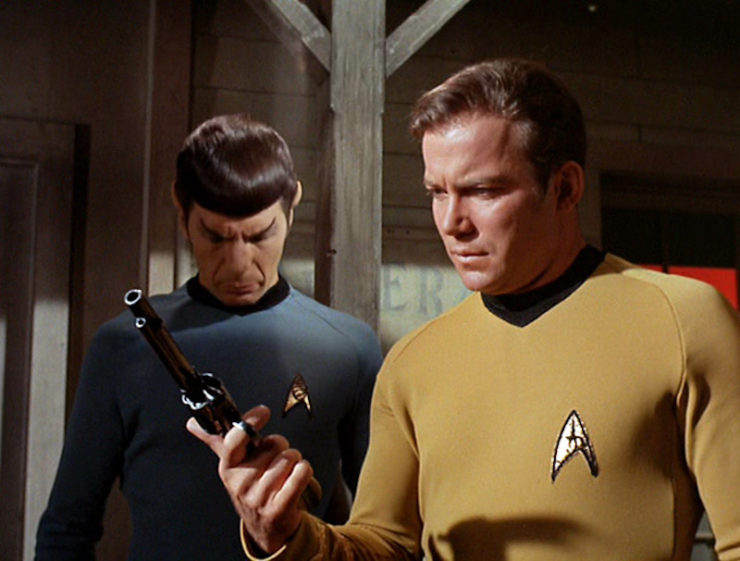“Space: the final frontier.” The opening words of the original Star Trek series intro handily sums up the logic of the space western genre. The Wild West is no longer wild, and has not been for some time. But space is unexplored, untamed, and not fully under the control of a central government, and/or federation. Exchange six-guns for lasers, a horse for a starship, and cattle rustlers for Klingons, and you’re ready to send those old adventure tropes off to the galactic rodeo.
In the original series, Captain Kirk swaggers like a border sheriff through many a lawless outpost. But the episode that most directly shoots at Star Trek’s Western roots is Season Three’s “The Spectre of the Gun,” aired in 1968. Faced with old timey gun fighters, the crew of the Enterprise both lean into the Western genre and try to escape from it—with mixed success. Even at warp speed, it turns out, it’s hard to outride the horse you’re sitting on.
“The Spectre of the Gun” starts as the Enterprise encounters a warning, delivered by telepathic buoy, from a reclusive species known as the Melkotians. The Melkotians tell the ship to stay away, but Kirk has strict orders from the Federation to beam down onto the planet. Once on the surface, the landing party discovers that their phasers and communicators are disabled. After being berated by a giant green Melkotian head, they are transported to Tombstone, Arizona, on the day of the shootout at the O.K. Corral. Kirk, Spock, McCoy, Chekov, and Scott find themselves mistaken for the infamous Clanton gang, destined to be killed at 5:00 by the Earp brothers and Doc Holliday.
The episode is fascinated, as Spock might say, with the historical specificity of the Earp/Clanton battle. It makes sure to repeated reference the actual date of the fight (October 26, 1881) and much is made of the fact that Billy Claiborne (Chekov, here) escaped the showdown unharmed.
Moreover, the aliens tell Kirk that they have chosen this particular doom for him specifically because of who he is. Kirk notes that his ancestors were involved in U.S. westward expansion. Being shot down by the Earps is a kind of karmic retribution for the violence of the captain’s own heritage—the historical truth is also an ongoing spiritual truth and burden. The gunfight at the O.K. Corral is something that happened in the past, but also something that has continued resonance—not least because Kirk is still ignoring boundaries along the frontier just as his forefathers did. Ike Clanton was shot for ignoring brands and stealing cattle; Kirk is similarly going to be shot for ignoring warning buoys and landing where he wasn’t wanted. The Western genre has its revenge on science fiction, here, because science fiction in many ways is still the Western.
“Spectre of the Gun” insists on the Western’s truth and relevance. But at the same time it also is at pains to show that the Western isn’t real.

The Enterprise crew is transported, not to a historically accurate representation of Tombstone, but to a weird, half-formed town that looks like it has dropped in from some eerie Hollywood sound stage. The sky is an angry red, and many buildings are little more than facades with nothing behind them. The town is sparsely populated; there’s hardly anyone there but the Earps, a voluble sheriff, and Sylvia (Bonnie Beecher), a woman in love with Billy Claiborne/Chekov, much to Chekov’s delighted surprise.
The Earps themselves are a menacing presence, but one that deliberately lacks verisimilitude: Actors Ron Soble, Rex Holman, Sam Gilman, and Charles Maxwell as the evil antagonists barely twitch their mustache muscles, and speak in a half whispered monotone. They’re a morose, robotic dream of Western badmen, wandering between cardboard tumbleweeds beneath a red-painted sky.
Eventually Spock figures out the fairly obvious; the crew hasn’t been teleported back in time at all. They’re in a psychic representation, or film version, of the O.K. Corral battle, rather than actually fighting the battle itself. They can’t beat the Erps in a fair fight, but they don’t have to. All they need to do is to stop believing—in the simulation, and by extension the genre—and it will cease to have power over them. Spock mind-melds with each of his companions (except Chekov, who has died temporarily) to make sure they do not harbor a single doubt that the O.K. Corral is not real.
Thus fortified, the crew faces a hail of bullets imperturbably, letting the barrage simply fly through them to cut up the fencing behind. Kirk then beats the tar out of Wyatt Earp hand to hand, and refuses to shoot him. The Melkotians are so impressed with this restraint (“Captain Kirk, you did not kill. Is this the way of your kind?”) that they transport the crew back to the Enterprise, and agree to open peaceful relations.
In a brief conversation before the final credits, Spock asks Kirk why he didn’t kill Earp, even though he wanted to. Kirk responds, with characteristic Shatnerian self-satisfaction, that humans have overcome their violent impulses.

Those violent impulses, here, are specifically figured as the Western genre itself. By refusing to believe in the reality of six-guns and shoot-outs, the Enterprise crew has freed itself from its violent, lawless past. Science fiction looks like the Western in some ways, the episode insists, but the future can rewrite history through sheer force of will, simply by convincing itself that that past is not real, or no longer applies.
It’s appealing to think that we can end violence, or the violent impulses in human nature, by slightly rejiggering our genre investments. But despite its stated faith in this message, there are aspects of the episode that suggest that Kirk’s smug certainty is a little premature…
Buy the Book


Fugitive Telemetry
Kirk doesn’t, after all, behave that differently from the white people who pushed across the United States stealing native land, many of whom also claimed their intentions were peaceful. The Melkotians ask the Federation to leave them alone; they specifically state that they associate Federation contact with disease and contagion. If we’re talking about American indigenous history, this is a pretty reasonable concern. European diseases devastated native populations in the Americas; by some estimates, smallpox and other diseases may have killed 80% of the indigenous population. The Enterprise crew knows the names of obscure white criminals on the American frontier, but seems entirely ignorant of one of the most sweeping demographic catastrophes in global history—a demographic catastrophe that is, moreover, extremely relevant to an exploratory force purportedly intent on doing no harm.
This ignorance of indigenous history is matched by the erasure of native people in the episode’s dream version of Tombstone. The fake town is populated by only white people. The one gesture towards racial difference is Spock, the alien Vulcan. As usual in Star Trek scripts, McCoy indulges in unprofessional xenophobia; he attacks Spock for being too logical and refusing to grieve for Chekov in the correct, human-approved way. The racist animosity towards Spock rather undermines the Federation’s contention that humans have left their hatreds behind them. If I were a Malkotian and witnessed how the crew treats Spock, I would be pretty nervous about making contact too. In the context of a faux genre Western town stripped of racial difference, this brief, intense, motiveless burst of racism directed at Spock is especially uncomfortable. It’s as if the episode has repressed the core, colonialist violence at the center of the Western genre only to have it break out, unexpectedly, in a burst of workplace harassment.
Kirk’s violent ancestors engaged in violence and shoot-outs at places like the O.K. Corral. He must, we are told, deny this aspect of the past, and refuse to believe in its continued relevance in order to spread peace across the galaxy. But refusing to believe in the past is not, in fact, a great way to avoid repeating it. Star Trek flies away from the Western into the future, only to find itself back at the O.K. Corral. The Federation says it comes in peace, but the Malkotians are right to be wary, still seeing the spectre of the gun in those proffered hands.
Noah Berlatsky is the author of Wonder Woman: Bondage and Feminism in the Marston/Peter Comics (Rutgers University Press).










